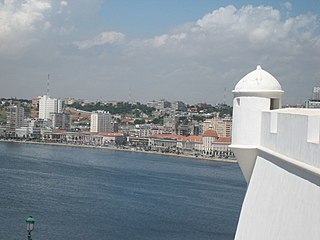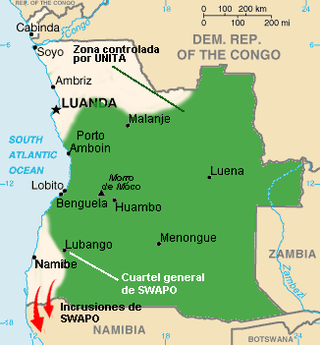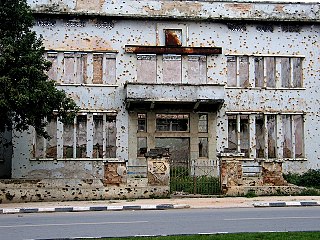
United Nations Security Council Resolution 435, adopted on September 29, 1978, put forward proposals for a cease-fire and UN-supervised elections in South African-controlled South West Africa which ultimately led to the independence of Namibia. Importantly, it established the United Nations Transition Assistance Group (UNTAG) which oversaw the election and the South African withdrawal.

Relations between Angola and South Africa in the post-apartheid era are quite strong as the ruling parties in both states, the African National Congress in South Africa and the MPLA in Angola, fought together during the Angolan Civil War and South African Border War. They fought against UNITA rebels, based in Angola, and the apartheid-era government in South Africa which supported them. Nelson Mandela mediated between the MPLA and UNITA during the final years of the Angolan Civil War. Although South Africa was preponderant in terms of relative capabilities during the late twentieth century, the recent growth of Angola has led to a more balanced relation.

United Nations Security Council Resolution 393, adopted on July 30, 1976, after a letter from a representative from Zambia, the Council condemned a recent attack by South Africa in Zambian territory, resulting in the destruction of property and loss of life. The resolution went on to express concern at South Africa's occupation and use of South West Africa as a base for attacking neighbouring African countries, and that the continuation of this would constitute a threat to international peace and security.

United Nations Security Council Resolution 428, adopted unanimously on May 6, 1978, after hearing representations from the People's Republic of Angola, Zambia and the South West Africa People's Organisation (SWAPO), the Council reminded Member States to refrain from using threats and use of force in their international relations. Reiterating Resolution 387 (1976), the present resolution condemned South Africa for its armed invasion of Angola via South West Africa (Namibia).

United Nations Security Council resolution 447, adopted on 28 March 1979, after hearing representations from the People's Republic of Angola and the South West Africa People's Organisation (SWAPO), the Council recalled resolutions 387 (1976) and 428 (1978) and condemned South Africa for its continuing raids in direct violation of prior resolutions.

United Nations Security Council resolution 454 was adopted on 2 November 1979. After hearing representations from the People's Republic of Angola, the Council recalled resolutions 387 (1976) and 447 (1979), noting its concern and condemned the continuing attacks on the country by South Africa through illegally-occupied South West Africa.

United Nations Security Council resolution 455, adopted on 23 November 1979, after taking note of representations from Zambia and recalling Resolution 424 (1978), the Council expressed concern and condemned the "illegal racist regime" in Southern Rhodesia for its "sustained pattern of violations aimed at destroying the economic infrastructure" of Zambia and causing a number of deaths.

United Nations Security Council resolution 475, adopted on 27 June 1980, after hearing representations from the People's Republic of Angola, the Council recalled resolutions 387 (1976), 447 (1979) and 454 (1979), and expressed its concern and condemned the continuing attacks on the country by South Africa through occupied South West Africa.

United Nations Security Council resolution 546, adopted on 6 January 1984, after hearing representations from the People's Republic of Angola, the council recalled resolutions 387 (1976), 428 (1978), 447 (1979), 454 (1979), 475 (1980) and 545 (1983), and expressed its concern at the continuing attacks on the country by South Africa through occupied South West Africa.

United Nations Security Council resolution 567, adopted unanimously on 20 June 1985, after hearing representations from the People's Republic of Angola, the Council recalled resolutions including 387 (1976), 428 (1978), 447 (1979), 454 (1979), 475 (1980), 545 (1983) and 546 (1984), and expressed its concern at the continuing attacks on the country by South Africa through occupied South West Africa.

United Nations Security Council resolution 571, adopted unanimously on 20 September 1985, after hearing representations from the People's Republic of Angola, the Council recalled resolutions including 387 (1976), 418 (1977), 428 (1978), 447 (1979), 454 (1979), 475 (1980), 545 (1983) and 546 (1984), and expressed its concern at the continuing attacks on the country by South Africa through occupied South West Africa.

United Nations Security Council resolution 574, adopted unanimously on 7 October 1985, after hearing representations from the People's Republic of Angola, the Council recalled resolutions 387 (1976), 418 (1977), 428 (1978), 447 (1979), 454 (1979), 475 (1980), 545 (1983), 546 (1984), 567 (1985) and 571 (1985), and expressed its concern at the continuing attacks on the country by South Africa through occupied South West Africa.

United Nations Security Council resolution 577, adopted unanimously on 6 December 1985, after reaffirming Resolution 571 (1985), the Council endorsed a report by the Security Council Commission of Investigation, condemning the regime in South Africa for its continued and unprovoked attacks against the People's Republic of Angola through the occupied territory of South West Africa.

United Nations Security Council resolution 602, adopted unanimously on 25 November 1987, after hearing representations from the People's Republic of Angola, the council recalled resolutions 387 (1976), 428 (1978), 447 (1979), 454 (1979), 475 (1980), 545 (1983), 546 (1984), 567 (1985), 571 (1985), 574 (1985) and 577 (1985), expressing its concern at the continuing military incursions into the country by South Africa through occupied South West Africa (Namibia).

United Nations Security Council resolution 804, adopted unanimously on 29 January 1993, after reaffirming resolutions 696 (1991), 747 (1992), 785 (1992) and 793 (1992), and expressing its concern at lack of implementation of the "Acordos de Paz para Angola" in Angola, the council approved a recommendation by the Secretary-General Boutros Boutros-Ghali to extend the mandate of the United Nations Angola Verification Mission II for a further three months until 30 April 1993.

United Nations Security Council resolution 851, adopted unanimously on 15 July 1993, after reaffirming resolutions 696 (1991), 747 (1992), 785 (1992), 793 (1992), 804 (1993), 811 (1993), 823 (1993) and 834 (1993), the Council noted the continuing deterioration of the situation in Angola and extended the mandate of the United Nations Angola Verification Mission II until 15 September 1993, discussing further the peace process in the country.

United Nations Security Council resolution 864, adopted unanimously on 15 September 1993, after reaffirming resolutions 696 (1991), 747 (1992), 785 (1992), 793 (1992), 804 (1993), 811 (1993), 823 (1993), 834 (1993) and 851 (1993), the Council noted the continuing situation in Angola and went on to condemn and place international sanctions on UNITA.

United Nations Security Council resolution 903, adopted unanimously on 16 March 1994, after reaffirming Resolution 696 (1991) and all subsequent resolutions on Angola, the Council strengthened and extended the mandate of the United Nations Angola Verification Mission II until 31 May 1994.

United Nations Security Council resolution 1180, adopted unanimously on 29 June 1998, after reaffirming Resolution 696 (1991) and all subsequent resolutions on Angola, particularly resolutions 1173 (1998) and 1176 (1998), the Council extended the mandate of the United Nations Observer Mission in Angola (MONUA) until 15 August 1998.

United Nations Security Council resolution 1221, adopted unanimously on 12 January 1999, after reaffirming Resolution 696 (1991) and all subsequent resolutions on Angola, particularly resolutions 1196 (1998) and 1219 (1998), the Council condemned the downing of two commercial planes over UNITA-controlled territory in Angola and demanded that UNITA leader Jonas Savimbi co-operate in the search for survivors of the recent plane crashes.











